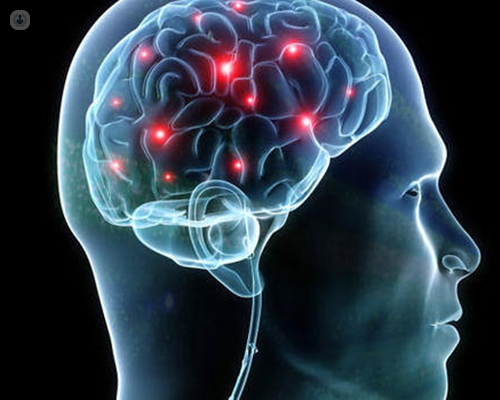Glioblastomas: your all-you-need-to-know guide
Autore:Glioblastomas are aggressive types of tumours that can affect the human brain and spinal cord, which are typically deemed as being highly invasive tumours that typically start in the brain.
In our latest article, expert and esteemed clinical oncologist, Dr Matthew Williams, explains in-depth exactly what a glioblastoma tumour is, what the main symptoms are, as well as providing an overview of the various different treatment options available to patients.

What is glioblastoma and what are the main symptoms?
Glioblastoma (GBM) is the most common brain tumour in adults. It is a primary brain tumour (i.e. begins in the brain), and is extremely difficult to treat. Symptoms vary between patients, but typically include headaches, nausea, weakness down one side, as well as problems with memory and speech. However, there are numerous amounts of other causes for these symptoms, and so the diagnosis is normally only initially suspected after a scan of the head.
What are the causes of glioblastoma?
As far as we know, there are no common causes for GBM. They are more common in older patients, and slightly more common in men, but apart from some very rare family syndromes, or patients who have had radiation exposure previously, there are no real causal factors. Common lifestyle factors, such as smoking, sleep, or diet, do not seem to increase your chance of developing a glioblastoma tumour.
What is the most effective treatment option for glioblastoma?
The most effective treatment is a combination of surgery, radiotherapy and chemotherapy, wherever possible. However, not every tumour is in a place where it can be operated on, and not every patient is well enough to have radiotherapy and chemotherapy. Making these decisions is complex and difficult, and needs a careful assessment of the patient, as well as a thorough discussion of both the pros and cons of the different treatment options available for patients.
Is it hereditary? If so, can it be tested for?
Very rarely is it hereditary. There are some very rare familial syndromes that can increase one’s chances of developing a brain tumour, but these are very rare. For most people, we think that getting diagnosed with a glioblastoma tumour is no more than bad luck.
What are the known statistics, and should a patient rely on them?
There are widely publicised statistics on survival rates in GBM. In general, these are accurate for a group of "standard" patients. However, for patients who are older or younger than the "standard", or where we have additional information on their tumour, these survival predictions can be quite misleading. I would encourage patients to discuss with their oncologist.
What should be expected during recovery from glioblastoma?
The aim of treatment is to keep people as well as possible for as long as possible. In some cases, that may be many years, but unfortunately, many patients will succumb to their disease earlier than that.
What additional treatments are available for GBM?
Outside of standard treatment, patients should be aware of the option of looking at and considering using other chemotherapy options, such as the use of a second round of radiotherapy (re-irradiation), the use of Avastin (Bevacizumab) as well as Optune.
What is Optune?
Optune is one of the few devices that has been shown to improve outcomes in patients with GBM. It is difficult to access, but we have significant experience in helping patients get access to Optune, and currently have the largest patient experience in the UK.
What is NGS (Next-Gen Sequencing)?
Next-gen sequencing (NGS) is an attempt to move beyond the standard testing for a few genes to look for mutations that might make the tumour more susceptible to various drug treatments. Standard NGS is available for all NHS brain tumour patients, but we sometimes also use extended NGS and additional computational tools to better understand and predict tumour behaviour.
Dr Matthew Williams is a mightily experienced London-based clinical oncologist who specialises in the diagnosis and treatment of brain tumours. If you are concerned and feel as though you may be suffering from some of the main symptoms of glioblastoma tumours, rest assured that expert medical help and advice is at your disposal. Visit Dr Williams’ Top Doctors profile here to book an appointment with him.


